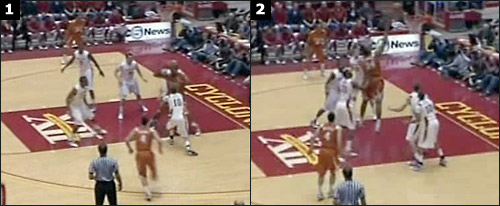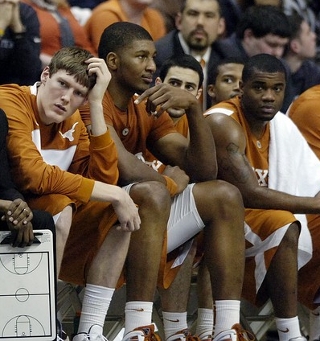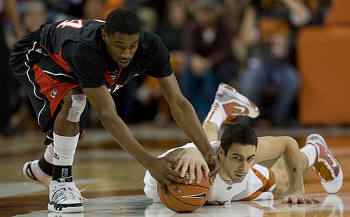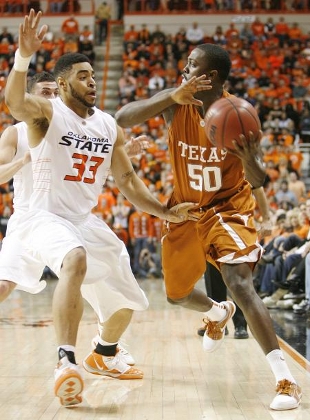There’s an 800-pound gorilla in the room, and it’s actually a 290-pound center named Dexter Pittman. More accurately, it’s not the center himself that is the problem no one seems to address, but rather his role in the Texas gameplan.
Make no mistake — we won’t be bashing Pittman here today. It’s hard to fault a kid who’s drawing double-teams, triple-teams, and even the occasional quadruple-team as soon as he touches a basketball. But it’s a commonly accepted fact that the Texas offense has to run through Pittman’s big hands, and for a multitude of reasons, it’s been tough to do that the last few weeks.
In his last five games, Dexter has averaged just five points in 19.2 minutes per contest. He’s shooting just 39% over that stretch. In the 15 games prior to this slide, Big Pitt was making over 74% of his shots from the field. Take a moment to let that sink in. For two entire weeks, Dexter Pittman’s shooting percentage has been cut almost completely in half.
How could such a drastic change happen? The simple answer, of course, is that the competition is tougher and that these better opponents are game-planning for the big man. While that’s definitely one piece of the puzzle, it’s not the entire problem facing Dexter, and in the larger scheme, the entire Texas offense.
Take a look at the picture below, a side-by-side comparison from the Iowa State game that Sports Illustrated writer Luke Winn posted in his power rankings two weeks ago.

At the time, it was actually fairly hilarious to see that the Cyclones couldn’t even contain Pittman with all five men. But the picture actually underscores a glaring weakness in the Texas offfense.
Clogging the paint
Rick Barnes is a defense-first coach, and as a result, that often leads to lineups containing both Justin Mason and Dogus Balbay. Both are fine basketball players that bring different skills to the table. Balbay is a fantastic facilitator, and the second-half meltdown in Storrs on Saturday underscores how important he is to the offense. Mason is a hard-nosed defender like Balbay, and his hustle and experience cannot be understated. But the one thing the pair doesn’t bring to the table is any offensive threat beyond driving to the basket.
When the Longhorns manage to get an entry pass in to the big man — and even that has been difficult as of late — the defenses predictably collapse and Pittman must make a quick decision. Kick the ball to a teammate that has been abandoned by the defense’s trap, or make a strong move to the basket before the help arrives. With Balbay and Mason on the floor at the same time, that frees up two extra defenders to harass Pittman. Opponents know that Dogus and Justin will not immediately sink a three, so there is absolutely no risk at all when their defenders sell out to stop the big man.
Of course, this does not even address the fact that defenses are also already sagging off of Mason and Balbay when they do have the ball, further diminishing their offensive threat as it makes it more difficult for the guards to blow by and get to the rim. Most importantly, though, it makes it nearly impossible for Texas to get any sort of spacing on offense, which leads to the aforementioned issues the Horns have trying to gain post entry on a pass.
Perhaps a solution on the offensive side of the ball is to severely limit the number of minutes Mason and Balbay are together on the floor at any given time. It’s clear at this point that the only two Longhorns who can handle point guard duty are Dogus and J’Covan Brown. If Brown is handling point duty, Mason can fill in at the two to replace the defense Texas loses when Balbay leaves the floor. At the same time, the added scoring threat Brown provides means that having a “shooting” guard who really can’t shoot all that well won’t be as much of a problem.

Fouls have sidelined Pittman quite often lately
(Photo credit: Fred Beckham/Associated Press) |












